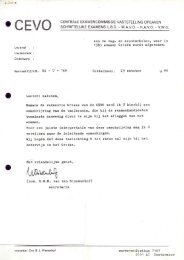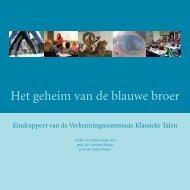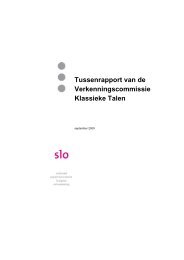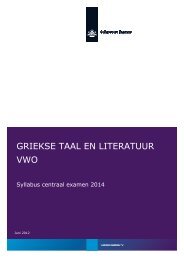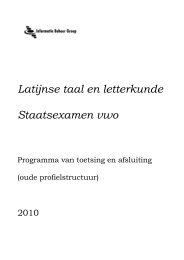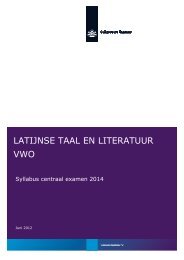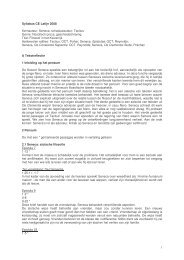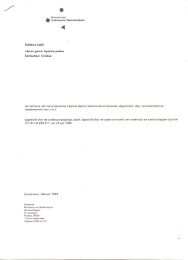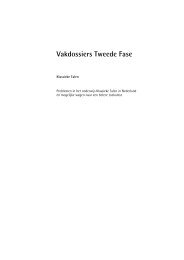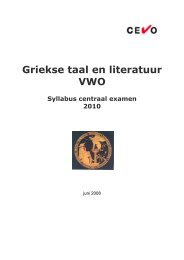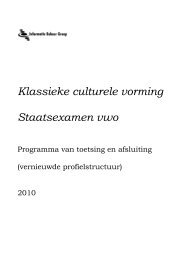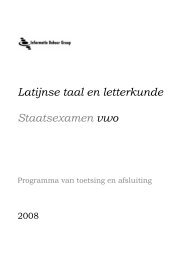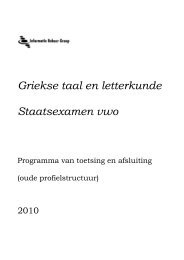Rome Wasn't Digitized in a Day - Council on Library and Information ...
Rome Wasn't Digitized in a Day - Council on Library and Information ...
Rome Wasn't Digitized in a Day - Council on Library and Information ...
You also want an ePaper? Increase the reach of your titles
YUMPU automatically turns print PDFs into web optimized ePapers that Google loves.
205<br />
Blackwell <strong>and</strong> Mart<str<strong>on</strong>g>in</str<strong>on</strong>g> c<strong>on</strong>cluded that the <str<strong>on</strong>g>in</str<strong>on</strong>g>tegrati<strong>on</strong> of <str<strong>on</strong>g>in</str<strong>on</strong>g>formati<strong>on</strong> technology <strong>and</strong> new models of<br />
faculty-student collaborati<strong>on</strong> <str<strong>on</strong>g>in</str<strong>on</strong>g>to c<strong>on</strong>venti<strong>on</strong>al classical teach<str<strong>on</strong>g>in</str<strong>on</strong>g>g would be necessary not just to<br />
re<str<strong>on</strong>g>in</str<strong>on</strong>g>vigorate the discipl<str<strong>on</strong>g>in</str<strong>on</strong>g>e but also to keep it relevant:<br />
Because technology has lowered the ec<strong>on</strong>omic barriers to academic publish<str<strong>on</strong>g>in</str<strong>on</strong>g>g—a reality that<br />
too few publish<str<strong>on</strong>g>in</str<strong>on</strong>g>g Classicists have fully understood—it is easy to guide student-writers <str<strong>on</strong>g>in</str<strong>on</strong>g>to<br />
becom<str<strong>on</strong>g>in</str<strong>on</strong>g>g student-authors. We who teach Classics can add to our pedagogy the technological<br />
tools of the <str<strong>on</strong>g>in</str<strong>on</strong>g>formati<strong>on</strong> ec<strong>on</strong>omy, thus arm<str<strong>on</strong>g>in</str<strong>on</strong>g>g ourselves aga<str<strong>on</strong>g>in</str<strong>on</strong>g>st charges of impracticality <strong>and</strong><br />
at the same time possibly attract<str<strong>on</strong>g>in</str<strong>on</strong>g>g students whose <str<strong>on</strong>g>in</str<strong>on</strong>g>terests lie outside the Classics. And as<br />
digital libraries beg<str<strong>on</strong>g>in</str<strong>on</strong>g> to <str<strong>on</strong>g>in</str<strong>on</strong>g>ter-operate, they breathe new life <str<strong>on</strong>g>in</str<strong>on</strong>g>to largely disregarded scholarly<br />
genres <strong>and</strong> <str<strong>on</strong>g>in</str<strong>on</strong>g>vent entirely new <strong>on</strong>es—geographic <str<strong>on</strong>g>in</str<strong>on</strong>g>formati<strong>on</strong> systems, computati<strong>on</strong>al<br />
l<str<strong>on</strong>g>in</str<strong>on</strong>g>guistics, <strong>and</strong> so forth (Blackwell <strong>and</strong> Mart<str<strong>on</strong>g>in</str<strong>on</strong>g> 2009).<br />
N<strong>on</strong>etheless, it seems that such calls are be<str<strong>on</strong>g>in</str<strong>on</strong>g>g <strong>on</strong>ly partially heard, even <str<strong>on</strong>g>in</str<strong>on</strong>g> terms of much less<br />
“radical” <str<strong>on</strong>g>in</str<strong>on</strong>g>novati<strong>on</strong>. Recent research by Dimitrios Vlachopoulos has <str<strong>on</strong>g>in</str<strong>on</strong>g>vestigated the percepti<strong>on</strong>s of<br />
academic staff that teach classical languages (Greek <strong>and</strong> Lat<str<strong>on</strong>g>in</str<strong>on</strong>g>) regard<str<strong>on</strong>g>in</str<strong>on</strong>g>g the use of “<strong>on</strong>l<str<strong>on</strong>g>in</str<strong>on</strong>g>e activities”<br />
<str<strong>on</strong>g>in</str<strong>on</strong>g> their teach<str<strong>on</strong>g>in</str<strong>on</strong>g>g (Vlachopoulos 2009). In the first phase of this research, 33 <str<strong>on</strong>g>in</str<strong>on</strong>g>structors <str<strong>on</strong>g>in</str<strong>on</strong>g> Greece,<br />
Spa<str<strong>on</strong>g>in</str<strong>on</strong>g>, <strong>and</strong> the United States were asked to complete a three-part survey. The first part asked them<br />
about their “digital profile” <strong>and</strong> their general level of <str<strong>on</strong>g>in</str<strong>on</strong>g>formati<strong>on</strong> <strong>and</strong> ICT underst<strong>and</strong><str<strong>on</strong>g>in</str<strong>on</strong>g>g. The sec<strong>on</strong>d<br />
part asked them to evaluate the potential of ICT <str<strong>on</strong>g>in</str<strong>on</strong>g> classics <strong>and</strong> whether or not they or their students<br />
had the knowledge to actively utilize such technology, <strong>and</strong> the third part asked <str<strong>on</strong>g>in</str<strong>on</strong>g>structors to outl<str<strong>on</strong>g>in</str<strong>on</strong>g>e<br />
the most significant challenges <str<strong>on</strong>g>in</str<strong>on</strong>g> us<str<strong>on</strong>g>in</str<strong>on</strong>g>g ICT for <strong>on</strong>l<str<strong>on</strong>g>in</str<strong>on</strong>g>e course delivery. In the sec<strong>on</strong>d phase of this<br />
research, <str<strong>on</strong>g>in</str<strong>on</strong>g>terviews were c<strong>on</strong>ducted with about half of the participants. Vlachopoulos emphasized that<br />
most of the participants were worried about the future of their departments <strong>and</strong> the amount of fund<str<strong>on</strong>g>in</str<strong>on</strong>g>g<br />
they received from their universities. “It was a comm<strong>on</strong> belief that new strategies need to be designed,”<br />
Vlachopoulos reported, “<str<strong>on</strong>g>in</str<strong>on</strong>g> order to attract more students every year <strong>and</strong> to offer them more job<br />
opportunities.”<br />
The analysis of the survey <strong>and</strong> <str<strong>on</strong>g>in</str<strong>on</strong>g>terview results led Vlachopoulos to classify the <str<strong>on</strong>g>in</str<strong>on</strong>g>structors <str<strong>on</strong>g>in</str<strong>on</strong>g>to three<br />
groups: c<strong>on</strong>servatives, who were completely closed to the use of <str<strong>on</strong>g>in</str<strong>on</strong>g>novative ICT <str<strong>on</strong>g>in</str<strong>on</strong>g> the classroom;<br />
ma<str<strong>on</strong>g>in</str<strong>on</strong>g>stream, who even if they stated they were <str<strong>on</strong>g>in</str<strong>on</strong>g> favor of major changes <str<strong>on</strong>g>in</str<strong>on</strong>g> teach<str<strong>on</strong>g>in</str<strong>on</strong>g>g, were “risk<br />
averters” <strong>and</strong> faced significant problems <str<strong>on</strong>g>in</str<strong>on</strong>g> deploy<str<strong>on</strong>g>in</str<strong>on</strong>g>g ICT; <strong>and</strong> early adopters, who were open to the<br />
<str<strong>on</strong>g>in</str<strong>on</strong>g>novative use of ICT <str<strong>on</strong>g>in</str<strong>on</strong>g> their classrooms. Despite the fears stated above about need<str<strong>on</strong>g>in</str<strong>on</strong>g>g new methods<br />
to attract students, 46 percent of the group fell <str<strong>on</strong>g>in</str<strong>on</strong>g>to the ma<str<strong>on</strong>g>in</str<strong>on</strong>g>stream, with 30 percent classified as<br />
c<strong>on</strong>servatives <strong>and</strong> <strong>on</strong>ly 24 percent identified as early adopters. 631 Vlachopoulos stated that while early<br />
adopters wanted to create new roles <str<strong>on</strong>g>in</str<strong>on</strong>g> the classroom, explored new teach<str<strong>on</strong>g>in</str<strong>on</strong>g>g methods with technology,<br />
<strong>and</strong> reported a high level of will<str<strong>on</strong>g>in</str<strong>on</strong>g>gness to pursue experimentati<strong>on</strong>, ma<str<strong>on</strong>g>in</str<strong>on</strong>g>stream faculty wanted “proven<br />
applicati<strong>on</strong>s of recognized value” before they deployed them <str<strong>on</strong>g>in</str<strong>on</strong>g> their classroom <strong>and</strong> also needed<br />
significant technical support for almost all ICT applicati<strong>on</strong>. Expla<str<strong>on</strong>g>in</str<strong>on</strong>g><str<strong>on</strong>g>in</str<strong>on</strong>g>g this group classificati<strong>on</strong> further,<br />
Vlachopoulos detailed that:<br />
Only 15% of the <str<strong>on</strong>g>in</str<strong>on</strong>g>structors can be identified as early adopters c<strong>on</strong>cern<str<strong>on</strong>g>in</str<strong>on</strong>g>g their skills <str<strong>on</strong>g>in</str<strong>on</strong>g> us<str<strong>on</strong>g>in</str<strong>on</strong>g>g<br />
ICT for learn<str<strong>on</strong>g>in</str<strong>on</strong>g>g activities. These <str<strong>on</strong>g>in</str<strong>on</strong>g>dividuals have studied computer science for pers<strong>on</strong>al use<br />
<strong>and</strong> use ICT every day <str<strong>on</strong>g>in</str<strong>on</strong>g> their pers<strong>on</strong>al life <strong>and</strong> almost every class they give. The majority of<br />
the <str<strong>on</strong>g>in</str<strong>on</strong>g>structors (55%) bel<strong>on</strong>g to the ma<str<strong>on</strong>g>in</str<strong>on</strong>g>stream category s<str<strong>on</strong>g>in</str<strong>on</strong>g>ce they haven’t studied computer<br />
631 This appears to c<strong>on</strong>firm the earlier f<str<strong>on</strong>g>in</str<strong>on</strong>g>d<str<strong>on</strong>g>in</str<strong>on</strong>g>gs of the CSHE study (Harley et al. 2006b) that classicists use digital resources <str<strong>on</strong>g>in</str<strong>on</strong>g> the classroom less<br />
frequently than do scholars other discipl<str<strong>on</strong>g>in</str<strong>on</strong>g>es.



